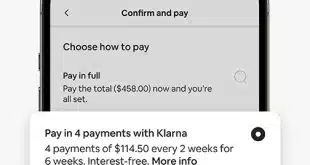Consumers carrying around the next-generation Samsung Galaxy S5 smart phone will be able to use PayPal with a tap on the device’s biometric sensor.
The smart phone, scheduled for release in April, will have a fingerprint sensor that enables consumers to use their online PayPal accounts to pay for purchases in stores and on mobile-commerce Web sites that accept PayPal. An upcoming smart watch, albeit without the biometric capability, also includes a PayPal app.
No biometric information is stored on PayPal servers, PayPal says. PayPal transaction authentication takes place via software on the phone that securely communicates between the fingerprint sensor, which is built into the phone’s Home button, and PayPal. The only information shared with PayPal is a unique encrypted key that enables PayPal to verify the identity of the consumer without having to store any biometric information on PayPal’s servers, PayPal says.
Apple Inc. was the first among smart-phone manufacturers to incorporate a biometric sensor, the Touch ID, when it released the iPhone 5s last fall. But, Apple has yet to attach any payment capability to the sensor. Earlier this year, reports surfaced that Apple may be preparing a mobile-payments service, but it has not materialized yet.
The fingerprint-based PayPal system will be available in 26 nations.
The PayPal/Samsung announcement is a major move for the Fast Identity Online Alliance, which aims to replace user names and passwords with stronger forms of authentication, says Shirley Inscoe, senior analyst at Boston-based Aite Group LLC. PayPal Inc. is one of the founding members of the alliance.
“Up to this point, many of these providers have been joining and talking about interoperability and the need to secure transactions,” Inscoe says. “The announcement is the first step to actually putting something into production.”
She says that is important if m-commerce, which includes mobile payments, is to gain greater acceptance among U.S. consumers. “Whether it’s online or mobile commerce, consumers are becoming wearier of fraud,” she says. “They’re hearing about data breaches, they may know someone who has been a victim of identity theft.”
That growing concern may lessen consumer reluctance about using biometrics for payments, she says. As devices like the iPhone 5s become available, and consumers become accustomed to biometric authentication for online gaming sites, Inscoe suggests the culture may be changing and “evolving so that people don’t feel it as a threat, but as something to make them safe and more secure.”
Will the PayPal/Samsung move put pressure on Apple to offer a mobile-payment scheme using its biometric sensor? While Inscoe says it is not fair to compare the phones based on their technology, because the iPhone 5s is several months old now, she would be surprised if Apple did not sense pressure to do something along these lines.
Apple is known to be curious about mobile payments, with Tim Cook, its chief executive, calling mobile payments a “big opportunity on the platform” during a January conference call. Apple did not respond to a Digital Transactions News inquiry.
Samsung’s Gear 2 smart watches also will incorporate PayPal, enabling consumers wearing the watches to check in and pay at PayPal-accepting merchants, redeem offers, and make person-to-person payments. Consumers tap the watch screen to scroll through menus to view offers, accept them, and to pay. In a video example, PayPal shows an animated consumer tapping the watch screen to check in at a merchant, and then tapping to confirm the payment. PayPal did not provide more details about how the technology works and how the watch determines its location.






